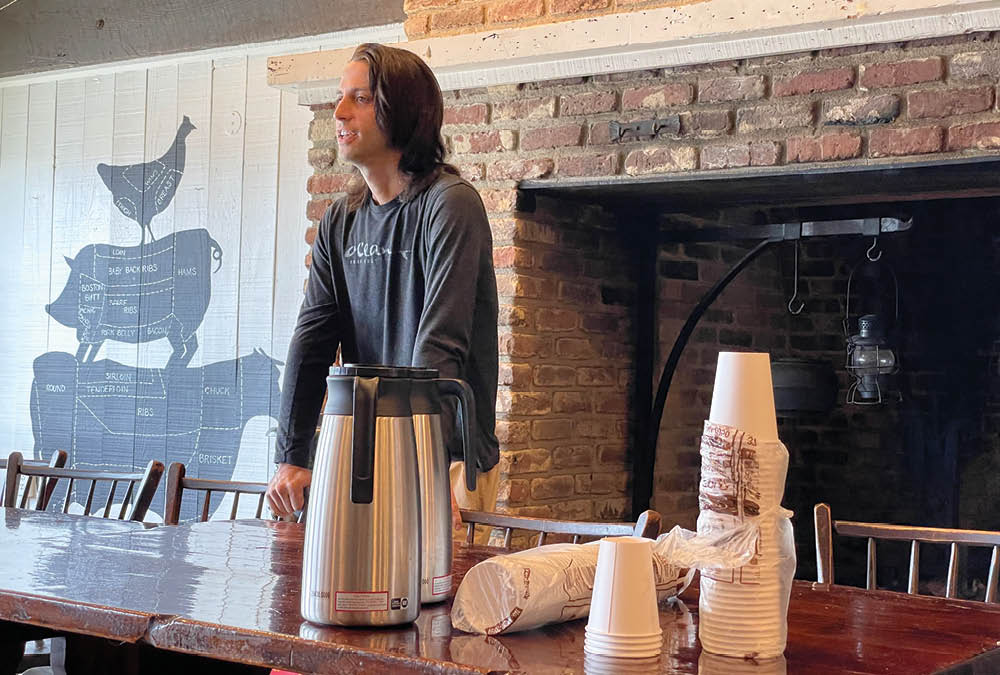Local coffee shop owners and roasters gather with area business leaders for an informative ‘coffee talk’
by Lorne Chambers | Editor
Many business deals, both large and small, have been sealed over a cup of coffee. So it was apropos that as the local business community tries to get back to some sort of normal functioning that the West Ashley-James Island Business Association (WAJIBA) would host local coffee shop owners and roasters for a “coffee talk.”
Owners from West Ashley coffee shops Highfalutin Coffee Roasters, Bruke’s Coffee & Craft Ice Cream, Charleston Coffee Exchange, and Muddy Water’s on James Island created an informal panel at last month’s WAJIBA meeting to discuss what actually goes into owning and running a successful local coffee shop in the age of Starbucks.
Kicking off the meeting, which was held Aug. 18 at Bessinger’s BBQ, was Dr. Paul Roof, a professor of Sociology at the College of Charleston and South Carolina State. Roof who started the Instagram page @charlestoncoffeeloversunited, where he documents local coffee culture in Charleston. He also gives a lecture on the importance of coffee shops in a community as a gathering place and takes his students to downtown café Kudu Coffee for them to experience the community feel of the place.
According to Roof, coffee shops are a classic “third place,” a sociological term used to describe somewhere that’s not your home, not your work, but another place you go often. He uses the TV show Cheers as an example, local coffee shops are a place where everybody knows your name.
Adam Hunt, owner of Highfalutin Coffee Roasters on Magnolia Road in Avondale said owning a coffee shop is one of those things that people often dream about but don’t really understand what is actually involved in the business-side of it, including the cost of the coffee beans themselves. He says until you understand the hard costs of it, you might not understand why a simple cup of coffee can be $3-4 at a specialty shop like his.
“I always tell people, ‘if you want to make a lot of money, don’t own a coffee shop.’ But if you love people and you love coffee and you don’t mind working really hard, it can be fantastic,” said Hunt.
Hunt, who roasts his own coffee for Highfalutin, talked specifically about the process of going from bean-to-mug, from the agricultural side to the chemistry of it.
“I’m also really into coffee, that’s why I named my business Highfalutin because I’m a really big coffee snob. So I figured if I just owned it, then I wouldn’t be too pretentious,” joked Hunt who brought in two different brews for the group of local business men and women to try.
Melissa Kelly, who along with her husband Paul, owns West Ashley’s oldest coffee shop, Charleston Coffee Exchange, located on the corner of Ashley River and Bees Ferry roads. Like Hunt, the Kellys also roast their own beans and spoke about sustainability in coffee farming and emphasized the importance of freshness in getting the optimum flavor out of their beans. Kelly says it’s this freshness that differentiates their beans from those you buy at a grocery store.
“Freshness, that is why you buy anything local — fresh eggs, fresh milk, fresh produce. Fresh beans roasted in your backyard every day by someone from here,” says Kelly.
Chris Bluemel, who owns Brukes Coffee & Craft Ice Cream on Old Towne Road, says education is the key to help people understand why a cup of coffee costs more at a local café.
“How do you justify the difference in a $2 cup of coffee and a $5 cup of coffee? I think the way you’re exposed to that education has a lot to do with the success we may or may not have,” says Bluemel, who is a professional musician by trade but has become educated himself in the importance of using quality beans. Unlike Highfalutin and Charleston Coffee Exchange, Bruke’s does not roast their own beans, but they make a point to use quality beans from local roaster who emphasize quality, sustainability, and ethical farming practices.
Beyond the beans, Hunt spoke philosophically about the role of coffee and coffee shops in our local community.
“One of the things I loves most about coffee is it’s a catalyst … it’s a drug, right? It helps us focus, it gives us energy. But people use coffee for all kinds of things, whether it’s religion, business, politics, or asking a girl out,” said Hunt. “I love to see when people come in on their first date and now they’re having their second kid.” It’s really fun to feel like you’re cultivating a place where life happens.”








